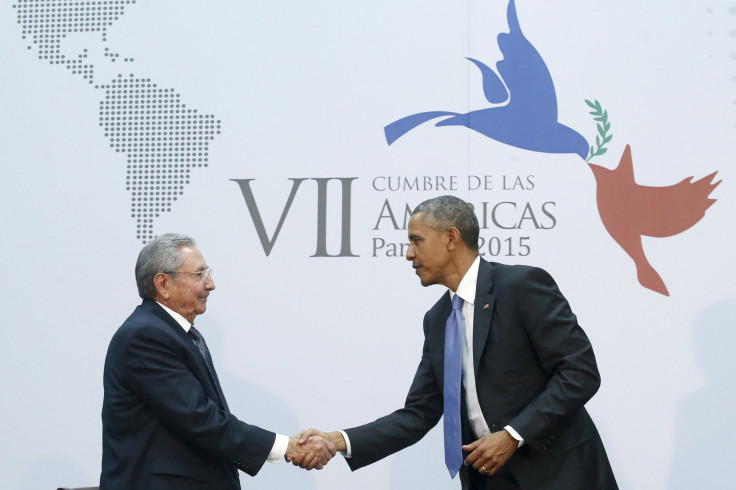Cuba's Castro Calls Obama An 'Honest Man' After Handshake At Panama Summit of the Americas

This story has been updated.
Update, 4:45 p.m. EDT: U.S. President Barack Obama and his Cuban counterpart Raúl Castro met Saturday on the sidelines of the Summit of the Americas in Panama City. The meeting marks the first sit-down talks between the U.S. and Cuba in nearly 60 years.
Castro said the two nations can respect each other's ideas, but that Obama shouldn't expect tensions to thaw overnight. "We are willing to discuss everything, but we need to be patient, very patient," the Cuban president said. "We might disagree on something today on which we could agree tomorrow."
The meeting is the most significant face-to-face exchange between U.S. and Cuban leaders since Dwight D. Eisenhower and Fugencio Batista -- the Cuban president ousted during the Cuban revolution -- met in 1956.
"This is obviously a historic meeting," Obama said at the start of his discussion with Castro, adding that decades of diplomatic tensions had done little to benefit either Cuban or U.S. citizens, according to media reports. "It was time for us to try something new," Obama said. "We are now in a position to move on a path toward the future."
"This shift in US policy represents a turning point for our entire region." --President Obama 11 April 2015 pic.twitter.com/gkhZhKCvzY
— scott horsley (@HorsleyScott) April 11, 2015Original Story Appears Below
Cuba's President Raul Castro called U.S. President Barack Obama "an honest man" at the Summit of the Americas in Panama City Saturday. His comment came after an ice-breaking handshake between the leaders as U.S.-Cuba relations continue to mend.
Castro said Obama bears "no responsibility" for the decades of hostilities between the two nations. "There were 10 presidents before him. All have some debt to us, but not President Obama," the Cuban leader said at the summit. He thanked Obama for considering the removal of Cuba from a U.S. list of state sponsors of terrorism.
"I have read his books, and I admire him and his life. I think a lot of his behavior has to do with his humble background," Castro said of Obama.
Speaking in Panama, Obama said the U.S. "will not be imprisoned" by its past relations with its former Cold War adversary. The U.S. severed relations with Cuba in 1961 after Fidel Castro signed a trade treaty with the Soviet Union. A year later, following the Cuban missile crisis, the U.S. imposed restrictions on Americans traveling to Communist-ruled Cuba and adopted a range of economic sanctions. In January, Obama began to ease travel and trade restrictions in a gradual effort to normalize relations.
"We're looking to the future," Obama said at the summit, attended by representatives of 35 countries.
The U.S. president was less friendly toward other Latin American leaders in his remarks. He fired back at Ecuador's President Rafael Correa, who earlier accused the U.S. of abandoning its founders' ideals of freedoms by intervening militarily and politically in Latin America, the Associated Press reported. Obama retorted that bringing up past grievances with U.S. foreign policy won't resolve Ecuador's internal political problems. He chided Correa for attempting to restrict press freedoms by punishing media outlets that criticized his administration.
Obama also addressed criticism by Latin American leaders over his recent sanctioning of Venezuelan officials for alleged human-rights abuses. He said the U.S. was not trying to meddle in other countries' affairs, but rather to uphold democratic ideals around the world.
Venezuela's President Nicolas Maduro said at the summit that he respects Obama, even though the U.S. leader "has threatened our motherland."
© Copyright IBTimes 2024. All rights reserved.





















